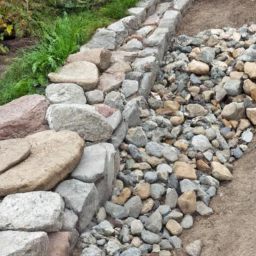How To Lay Rocks Landscaping
Table of Contents []
- How To Lay Landscaping Rocks
- Features of Landscaping Rocks
- Benefits of Landscaping Rocks
- Pros & Cons of Using Landscaping Rocks
- Case Studies
- FAQs
- Mistakes to Avoid
- Best Practices for Using Landscaping Rocks
- Summary
How To Lay Landscaping Rocks
How to Use Landscaping Rocks for the Perfect Garden
Summer is coming and you want to give your yard or garden a unique look with landscaping rocks. Whether you're a beginner or experienced gardener, installing landscaping rocks is an easy and beautiful way to spruce up your landscape. In this article, we'll look at the features, benefits, pros and cons, case studies, frequently asked questions, mistakes to avoid, and best practices of using landscaping rocks.
Features of Landscaping Rocks
Natural stones bring texture, color, and interest to your garden. Landscaping rocks also play a functional role, helping to regulate soil temperature, reduce erosion and control weeds. Unlike organic mulch and fertilizers, landscaping rocks can last for years with minimal maintenance.
Benefits of Landscaping Rocks
Using landscaping rocks offers many benefits to your landscape design. The main advantages are:
- Easy to install and maintain
- Enhance the aesthetic appearance of the landscape
- Keep soil temperature regulated
- Reduce erosion
- Keep weeds in check
Pros & Cons of Using Landscaping Rocks
Using landscaping rocks has its benefits and drawbacks. It's important to consider these pros and cons before making a decision about whether to use landscaping rocks in your garden.
Pros
- Cost-effective in the long term
- Can be used in areas that have difficulty retaining soil
- Retains heat and moisture for plants
Cons
- Can be costly to install
- Difficult to move or rearrange
- Needs additional water during installation
Case Studies
Let's take a look at two landscape projects that have achieved success by using landscaping rocks:
Case Study 1: Brooklyn Botanical Garden
The Brooklyn Botanical Garden is one of the oldest public gardens in the United States. To achieve their classic aesthetic, the garden uses natural stones to add texture and color to their landscape. This creates an eye-catching and timeless design that visitors love.
Case Study 2: Alice Keck Park Memorial Garden
The Alice Keck Park Memorial Garden in Santa Barbara, California, is a beloved local park. For this lush landscape, designers have used a variety of landscape rocks to add texture and interest to the garden. The mix of colors and sizes of rocks creates an inviting and peaceful atmosphere.
FAQs
What are the best types of landscaping rocks to use?
The best types of rocks for landscaping are large, flat flagstone, river rock, moss rock, granite, and quartzite.
Where can I buy landscaping rocks?
You can buy landscaping rocks from home improvement stores or online retailers. They are also available from specialty suppliers and rock quarries.
How much do landscaping rocks cost?
The cost of landscaping rocks depends on the type and size of the rocks. Generally, smaller rocks cost $0.10 to $0.30 per pound and larger rocks cost up to $4 or more per pound.
Mistakes to Avoid
When using landscaping rocks, there are a few common mistakes to avoid:
- Using rocks that are too small
- Not allowing enough space between rocks for drainage
- Not separating rocks with mulch or soil
- Not using weed-preventing fabric when required
Best Practices for Using Landscaping Rocks
If you're planning to use landscaping rocks in your garden, there are some best practices you should follow. These include:
- Planning your design in advance
- Choosing the right type of rocks for your needs
- Using weed-preventing fabric when necessary
- Allowing enough soil and mulch between the stones
- Using edging materials to define boundaries
Summary
Landscaping rocks are an easy and beautiful way to spruce up your garden or landscape. They offer a range of features and benefits that make them an attractive option for many gardeners. Before installing landscaping rocks, it's important to be aware of the pros and cons, common mistakes to avoid, and best practices for your design. Following these guidelines will help you create the perfect landscape with landscaping rocks.

Previous Page
Next Page
